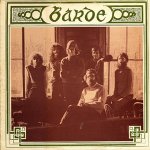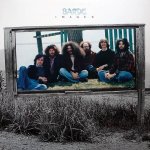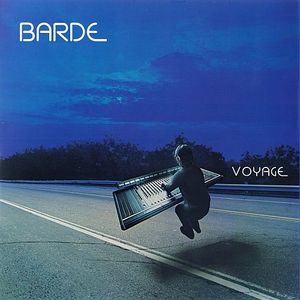 They were joined by two Montrealers: fiddler Eliot Selick, whose first love was the music of Cape Breton, and Pierre Guérin, a Québécois music fiend, both of whom had begun experimenting with Irish dance music and airs. By ’75 American immigrants Richard Chapman and Ed Moore were on board, and Barde was born, heavily influenced by the Chieftains and the Bothy Band. Chapman, Guérin, and Crilly were the main vocalists. Singing in English, French, and Irish, they blended traditional Celtic, Scottish and Québécois jigs and reels with some more modern folk elements, and before long a local fanbase turned province-wide, with Crillys and Selick’s twin fiddle attack becoming all the rave. In the early days Crilly’s sister Joanna Crilly was the group’s fluter. Between 1975 and 1980 Barde recorded and toured throughout North America, playing at many of the biggest folk and cultural festivals across the continent, becoming particularly popular in the Maritimes. Les Productions’ Ivan Miron saw them live one night and signed them to a management deal. This led to a recording deal with Direction Records in early ’77, and by that April the group were in Mark Productions studios in Ottawa with producers Quentin Meek and Bruce Murchison. A week later the basic tracks were done, and their eponymous debut album was in the stores that summer. The only original tune was Crilly’s “Jack McCann.” The others were traditional jigs and reels, and highlights included a medley of Cape Breton reels, and “Fanny Power” and “George Brabazon,” a pair written by Turlough O’Carolan (1670-1738), the legendary Irish harper, bard and composer. Barde continued to make waves on the festival circuit while working on some new original material. By this point, the band’s live show was near legendary, and Kinsella’s on-stage court jester outfit was a particular hit. They found a new home when Chicago label Flying Fish Records picked them up. IMAGES was released in the fall of ’78 with Meek returning to produce; this time recorded at Bill Brooks’ Studio Plus 4 in Athelstan, Quebec. Crilly had introduced some keyboards, pianos, and synthesizers in places, and critics raised their eyebrows, feeling it was deviating from their traditional roots. While predominantly the band’s own arrangements of those traditional jigs and reels, the album also contained a few new tracks – Chapman’s “Jenny’s Rambles”, Guerin’s “A La Claire Fontaine” and Selick’s “Rose Garden”. They headlined the ’78 Vancouver Folk Music Festival, and were one of the top draws at Mariposa, Philadephia and other festivals around the continent. Traditional music was experiencing a wave of popularity on both sides of the pond, and Barde were festival mainstays while making several trips to Europe over the next couple of years. Differing musical approaches and outside interests eventually played their part in Selick’s departure, then one by one others began leaving. By 1981 they were signed to Port Parole Records for VOYAGES in 1982. By this point the music had shifted from its traditional roots to an electric, more main stream polished blend, and the band’s core was Guérin and Kinsella, along with violinist Jacques Joubert, Richard Paquette on keyboards, and bassist Jocelyn Therrien. Drummer Michel Dion and guitarist Sylvain Clavette were added as well as some session players. Some songs were still in French, but there was more of an emphasis on the originals, like “Prairie Lady” and the lead-off “The Snow and The Frost Are All Over.” The band called it quits by the end of ’83 after its last appearance earlier that summer at the Winnipeg Folk Festival. Guérin moved to Winnipeg and became the artistic director of that festival a number of times over the years. He also worked on-air on radio and on several projects for the CBC eventually becoming the regional director for Radio Canada’s French Services in Western Canada. Crilly turned to solo and film work and now teaches at Concordia University in Montreal. Richard Chapman sang with the Montreal Symphony Chorus and is now a stellar guitar maker, Eliot Selick still plays terrific fiddle with enviable intonation. Toby Kinsella worked for some years in Québec and Ireland as a solo multi-instrument children’s entertainer, returning home to Ireland in 1990. He received his MA in story-telling from the University of Cardiff in 2009. We lost him to cancer that same year in Dublin. Ed Moore has succeeded in vanishing from the radar. In the late ’00s, BARDE and IMAGES were made available online.
|



